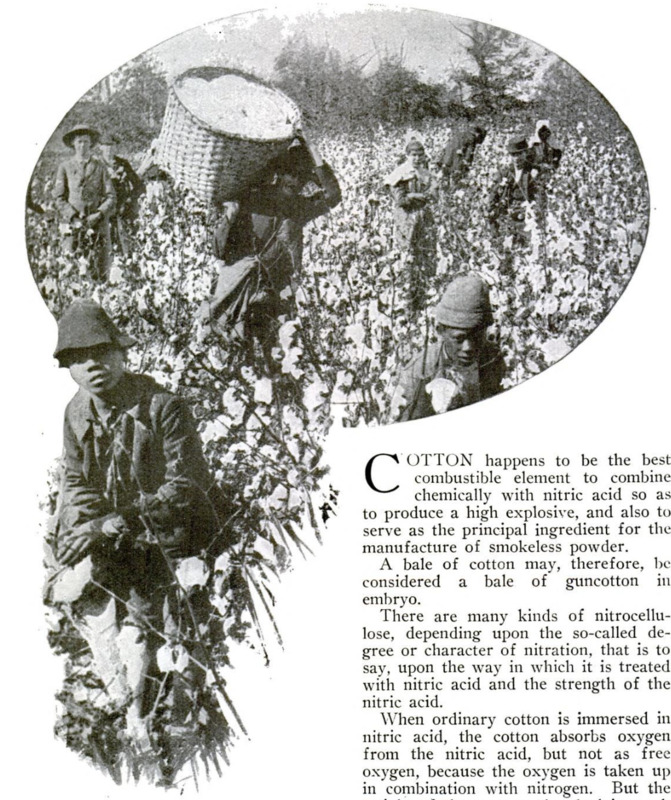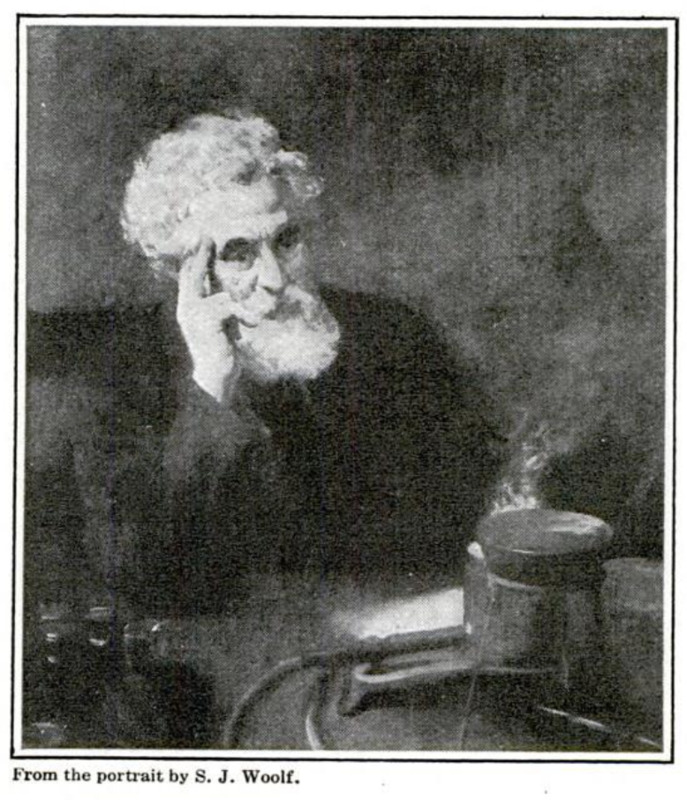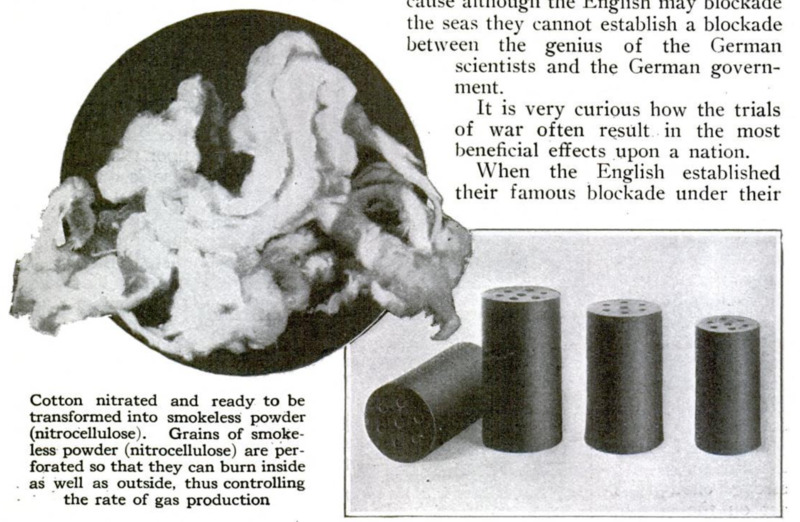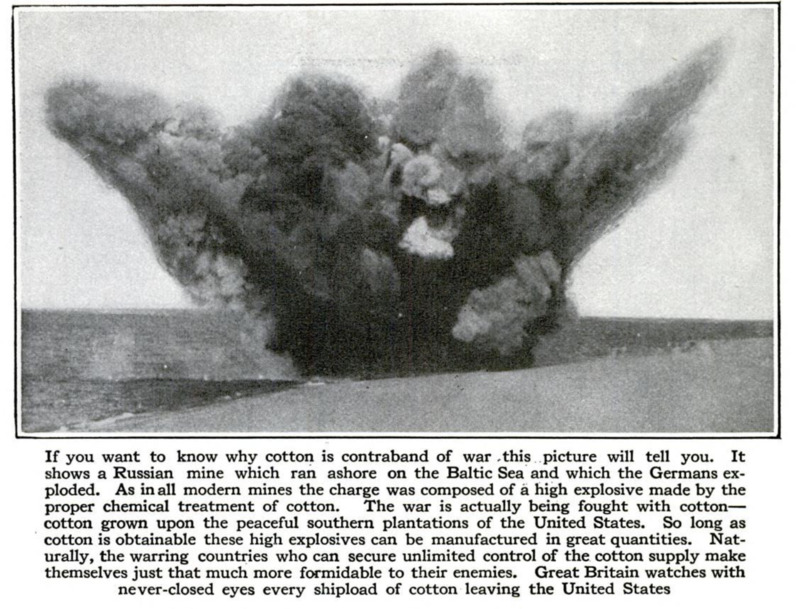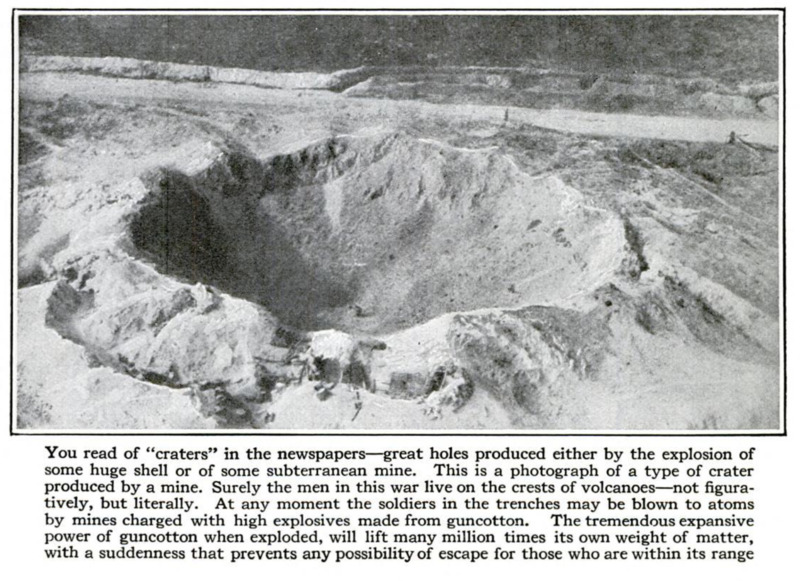-
Title (Dublin Core)
-
Why Cotton is Contraband of War
-
Article Title and/or Image Caption (Dublin Core)
-
Why Cotton is Contraband of War
-
extracted text (Extract Text)
-
COTTON happens to be the best
combustible element to combine
chemically with nitric acid so as
to produce a high explosive, and also to
serve as the principal ingredient for the
manufacture of smokeless powder.
A bale of cotton may, therefore, he
considered a bale of guncotton in
embryo.
There are many kinds of nitrocellu-
lose, depending upon the so-called de-
gree or character of nitration, that is to
say, upon the way in which it is treated
with nitric acid and the strength of the
nitric acid.
When ordinary cotton is immersed in
nitric acid, the cotton absorbs oxygen
from the nitric acid, but not as free
oxygen, because the oxygen is taken up
in combination with nitrogen. But the
weight of the oxygen absorbed is much
in excess of the weight of nitrogen, the
nitrogen acting merely as a carrier of
the oxygen. The appearance of the
cotton is not changed to any appreciable
extent, but the weight of the cotton is
considerably increased.
The oxygen which the cotton absorbs
from the nitric acid is sufficient to con-
sume all of the cotton without atmo-
spheric air, so that
when guncotton is
put in a_confined
space and set on
fire it explodes
with great vio-
lence, producing
what are called
carbon dioxide and
carbon monoxide,
with free nitrogen
and steam.
When the cotton
is immersed in the
nitric acid the acid
takes water out of
the cotton, which
dilutes the acid.
But the cotton gets
the best of the
bargain, because
the weight of oxy-
gen and nitrogen
which the cotton
receives is in ex-
cess of the weight
given up by the
cotton.
In order to keep
the nitric acid bath
strong enough to
act on the cotton,
and to minimize
the acid, it is nec-
essary to add sul-
phuric acid to ab-
sorb the water, and
it takes about
three parts sul-
phuric acid to one
part of nitric acid
to make a proper
‘mixture for this
purpose. The sul-
phuric acid, how-
ever, has no effect
whatsoever upon
the cotton. It merely acts to absorb the
water liberated from the cotton,
There are several ways in which the
cotton is treated with the acid mixture.
The oldest and simplest was merely
to immerse the cotton in the acid, and
when it was thoroughly nitrated to place
it in a centrifugal machine and wring
out the acid and throw it into an excess
of water to wash out the remainder.
The way that is
employed principal
ly by the United
States Navy is to
do the nitrating in
a centrifugal ma- |
chine and when |
the nitratingis |
complete to set the |
centrifugal ma- |
chine in motion, |
which extracts the |
acid from the ni- |
trocellulose. There
upon the nitrocellu- |
lose is quickly and
thoroughly washed. |
After the wash:
ing process is com- |
pleted there is a |
quantity of acid
remaining and
also there are con-
tained in the nitro-
cellulose certain |
unstable com
pounds. These are |
removed by thor-
aughly bode, the
nitrocellulose in a
large excess of |
water.
After this is done
the nitrocellulose is
pulped in an ordi-
nary pulping ma-
chine, Tike that
used fn making pa-
per pulp. When
this is thoroughly
done the finely
pulped mitre |
ose is gathered |
and pressed into |
cylinders, It still
contains a consid- |
crable percentage
of water, which must be removed in or-
der to dissolve or gelatinate it as a step
in converting it into smokeless powder.
This is done by forcing alcohol under
pressure through the mass of pulped
guncotton cake from the top, the water
beig forced down ahead of the alcohol
until it is driven entirely out at the bot-
tom, and alcohol takes the place of the
water.
This is called the replacement process,
and was discovered by Francis G. du
Pont. It is very important,
Making cotton contraband of war does
not prevent the Germans from making
guncotton from other materials. When
wood fiber or fiber obtained from grass
is treated with nitric acid it also becomes
a kind of guncotton. The German chem-
ists are very well able to make their gun-
cotton, and consequently their gunpow-
der and high explosives, from the trees
of the forest.
But nitric acid also is contraband of
war. How then are the Germans to get
their nitric acid?
Before the outbreak of the European
War the Germans had anticipated the
present blockade and prepared for it.
The German chemists and scientists had
developed a very practical, very efficient
and cheap method of producing nitro
compounds from the air, nitric acid
among them, by means of the electric
current.
I understand that today the Germans
are not only able to make all the nitro
compounds they need for the purposes
of explosives, both high explosives and
smokeless powder, but also what they
require for fertilizers for the farmers.
With a nation of scientists, chemists
and inventors like the Germans, it is
entirely impossible to stop them from
producing explosives in any quantity
they may desire, entirely independent of
any class of imported materials, be-
cause although the English may blockade
the seas they cannot establish a blockade
between the genius of the German
scientists and the German govern-
ment.
It is very curious how the trials
\ of war often result in the most
beneficial effects upon a nation.
When the English established
IN their famous blockade under their
Continental system in Napoleon's time,
the French were compelled to resort to
some other means than importation to
get their sugar. Consequently, they de-
veloped the sugar beet, and planted it in
enormous quantities, with the result that
I'rance introduced the sugar beet in-
dustry, which has been of vast im-
portance to that nation ever since.
Likewise, the English blockade against
Germany today is compelling the Ger-
mans to develop their internal industries
in a most phenomenal way. They have
solved the nitric acid problem, and very
likely they will continue, after the war
is over, fo make their nitric acid and
other nitro compounds from air. What
is more, they will probably compete suc-
cessfully with the natural nitrate of Chile.
-
Contributor (Dublin Core)
-
Hudson Maxim (writer)
-
Language (Dublin Core)
-
eng
-
Date Issued (Dublin Core)
-
1916-03
-
pages (Bibliographic Ontology)
-
412-415
-
Rights (Dublin Core)
-
Public Domain (Google digitized)
-
Archived by (Dublin Core)
-
Filippo Valle
-
Alberto Bordignon (Supervisor)
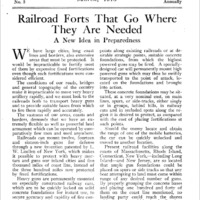 Popular Science Monthly, v. 88, n. 3, 1916
Popular Science Monthly, v. 88, n. 3, 1916

